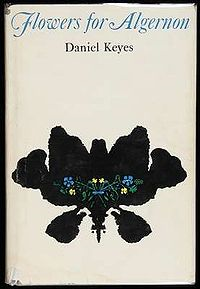

| Home | Daniel Keyes | "Flowers for Algernon" (the Short Story) |
Flowers for Algernon (the Novel) |
Charly (the film) |
Resources |
|---|

| Characters & Synopsis |
| Themes |
| Criticisms |
| Comparison of the Novel and the Short Story |
Mark R. Hillegas
Saturday Review, 1966
Flowers for Algernon "deals with moral, social, psychological, theological, or philosophical problems imagined as resulting from inventions, discoveries, or scientific hypotheses." It is a "work of quality science fiction" that "offers compassionate insight into the situation of the mentally retarded," but also is "marred by a cliche dialogue or a too predictable description."
Eliot Fremont-Smith
"The Message and the Maze"
The New York Times, 1966
Keyes "has taken the obvious, treated it in a most obvious fashion, and succeeded in creating a tale that is convincing, suspenseful, and touching--all in modest degree, but it is enough." In all, the novel is "proof of Mr. Keyes's deftness."
Robert Scholes
"An excerpt from Structural Fabulation: An Essay on Fiction of the Future"
University of Notre Dame Press, 1975
Flowers for Algernon is "minimal SF that, unlike some works of science fiction, establishes only one discontinuity between its world and our own." This discontinuity is the experiment that raises Charlie's intelligence. The novel is "beautifully problematic" and its power comes from the fact that the results of the surgery are only temporary. Scholes believes Keyes "has fleshed out his idea with great skill" as well.
Brian W. Aldiss
Trillion Year Spree: The History of Science Fiction
1986
Aldiss prefers the original short story rather than the novel because the "moving story lost something of its power when expanded to novel length."
Thomas D. Clareson
Understanding Contemporary American Science Fiction
1990
Flowers for Algernon is "unique in the science fiction pantheon" and has a double-edged theme involving "the unthinking brutality with which society treats the mentally retarded and the terrible isolation of soaring intellect." In addition, Keyes "revitalized the myth of Frankenstein by introducing a fresh narrative perspective" and uniting "Mary Shelley's nameless creature and the crazed scientist into the single figure of Charlie."
F. Brett Cox
"An overview of Flowers for Algernon"
Exploring Novels, Gale, 1998
The novel's power comes from the use of the first-person viewpoint. Charlie's journals dramatize his changes and the obstacles that he must deal with. Cox also suggests that Keyes uses Freudian analysis when Charlie's motivation from unconscious desires is traceable to his childhood experiences involving sex. Rose always wanted Charlie to be smarter, which is why he has a high motivation to learn. Rose was also abusive towards Charlie when he started having sexual thoughts, resulting in his inability to have sex with Alice.
"Strikingly original..."
--Publisher's Weekly
"Absorbing... Immensely original... Going to be read for a long time to come."
--Library Journal
"This novel should be on your 'must read list."
--Palm Beach Post Times
"Fascinating, agonizing... Superb."
--Birmingham News
"A tale that is convincing, suspenseful and touching..."
--The New York Times
"A classic bit of literature... a brilliant and fascinating tour de force... a literary achievement as unique as the subject itself."
-- Journal Star (Peoria)
"...Keyes has found a challenge in his material and has composed a gripping narrative..."
--Miami News